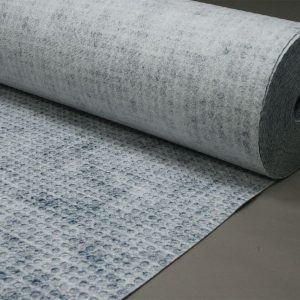Decoupling membranes are a type of tiling product used to prevent cracks and damage in tile installations by providing a separation layer between the tile and the substrate. These membranes absorb stress caused by movement in the substrate, such as expansion and contraction, preventing it from transferring to the tiles. This type of membrane is commonly used in areas where movement is expected, such as over concrete slabs, plywood substrates, or heated floors.
Characteristics of Decoupling Membranes
Flexible: The membranes are typically made from flexible materials, such as polyethylene or uncoupling mats, that can absorb movement and stress without transferring it to the tile surface.
Crack Isolation: One of the primary functions of these membranes is to isolate the tile installation from the substrate, preventing cracks in the tiles caused by movement or stress in the underlying structure.
Waterproofing: Many such membranes also provide a waterproofing barrier, protecting the substrate from water damage and preventing moisture from reaching the tile assembly.
Sound Reduction: Some membranes offer sound reduction properties, helping to reduce impact noise and sound transmission in multi-story buildings or high-traffic areas.
Easy Installation: Most membranes are designed for easy installation, typically requiring adhesive or mortar to bond them to the substrate. They can be cut to size and shaped to fit irregular surfaces, making installation efficient and straightforward.
Applications for Decoupling Membranes
Concrete Slabs: Commonly used over concrete slabs to prevent cracks in tile installations caused by substrate movement, shrinkage, or expansion.
Plywood Substrates: In installations over plywood or wood substrates, these membranes help to mitigate the effects of wood movement and prevent cracks in the tiles.
Heated Floors: Often installed over heated floors to accommodate the expansion and contraction of the substrate caused by temperature fluctuations.
Exterior Installations: Can be used in exterior tile installations, such as balconies, patios, and terraces, to protect against movement from temperature changes and weather exposure.
Benefits of Decoupling Membranes
Crack Prevention: Decoupling membranes effectively prevent cracks in tile installations by absorbing stress and movement from the substrate.
Waterproofing Protection: Many decoupling membranes provide a waterproofing barrier, protecting the substrate from water damage and ensuring the longevity of the tile assembly.
Sound Reduction: Some decoupling membranes offer sound reduction properties, improving acoustic comfort in indoor spaces.
Easy Installation: Decoupling membranes are easy to install and can be quickly applied to the substrate using adhesive or mortar.
Contact BaseTec - Complete Systems. Reliably Delivered.
If you require assistance with decoupling membranes or need advice on which decoupling membrane product is best suited for your requirements, contact our friendly teams in Kent - 01732 906 826 - or Leeds - 0113 521 6789.
Return to our full range of
Tiling Products.
